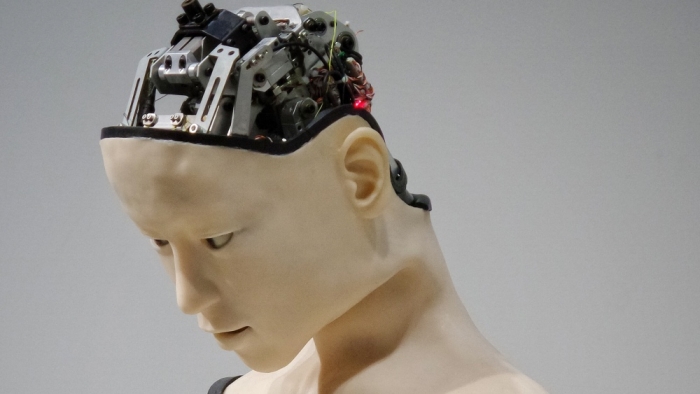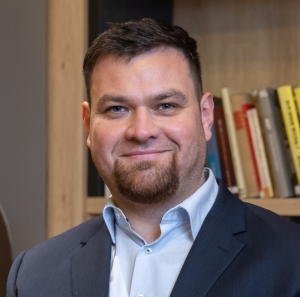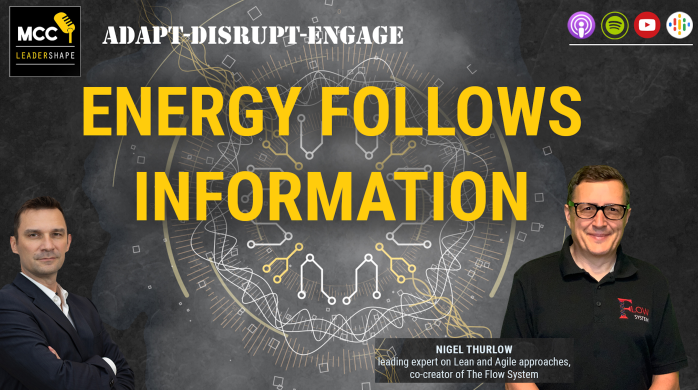Miklos Lukacs de Pereny, a Peruvian scholar who teaches at Universidad de San Martin de Porres in Lima and is currently a Visiting Fellow at MCC. His research fields are: Philosophy of Technology, Applied Ethics, and Science and Technology Studies.
*
Csongor Veress: What does Transhumanism mean?
Miklos Lukacs: Transhumanism is an ideology, a political movement, and a cultural movement which aims to enhance the physical, intellectual, cognitive and even moral capabilities of human beings by technological means. It is a desire to improve the human nature and by extension the human condition using technologies. It has three main objectives: super longevity, the desire to live forever which is the long-term aim; the second one is super intelligence, to be super smart. Actually, transhumanists believe that human beings intellectually are very poorly endowed individuals and that they are at the very early stages of evolutionary development right now. The third one is super wellbeing; the idea is that if you live super long and you are super smart, then your quality of life has to improve as well.
CsV: What does Bioconservatism mean?
ML: According to transhumanists, bioconservatism is a position against any kind of non-therapeutic scientific and technological applications on the human being. But there are differences: there are people who are in favor and against abortions. For me, bioconservatives are, by definition, people who are against the non-therapeutic applications of science and technology on the human nature, but also against abortion.
CsV: What do you mean by modification? For example, a tooth implant for you is not acceptable?
ML: Modification is what the Transhumanists call enhancements, so you are going to enhance yourself by fusing yourself with some kind of technology. So, it could be that you get implemented a device, a hard drive, or a chip. And there are more profound biotechnological changes, like gene modification which are also, according to them, enhancements, but deeper ones, because you modify your nature. The other ones are just fusing partially with some external device. However, this is another act of faith based on scientific possibilities, not facts.
CsV: Is Bioconservatism the opposite of Transhumanism?
ML: Yes. A bioconservative would agree with the usage of a peacemaker, although it is a technology implemented in your body because it is not an enhancement, but a life saving device. And this is the crucial difference because it has a therapeutical application, so in that sense it is technology at the service of human beings, not humans as guinea pigs for technological experimentation.
CsV: Are you a Bioconservative?
ML: I consider myself a bioconservative because I am against non-therapeutical changes in human nature and because I am against abortion.
CsV: Isn’t Transhumanism only a sci-fi?
ML: We have to make many distinctions because some of the things are sci-fi, but some of the things are not sci-fi anymore. Transhumanism is, and this is the fundamental distinction, based in many cases not in science, but in science fiction, because they are not thinking in scientific terms. Many aspirations of the transhumanists are not supported by science or scientific discoveries. For example, when they talk about endless life, that is an aspiration, there are some techniques that has been developed already, like cell regeneration or cell rejuvenation. Or widening telomers of chromosomes, for example thickening them, which is proved to extend life significantly. This experiment has been conducted on mice and it works. So, there are some technological advancements and techniques which are already applied and had been proven to extend the life span of creatures. But there are other ideas, like when you think of uploading your thoughts to the Cloud, that is science fiction because it is not based on scientific discoveries but scientific possibilities. And these are different.
So, their own ignorance on scientific facts and scientific possibilities leads them to say these are conspiracy theories, this is very natural when you do not understand something then you try to ridicule it, you try to deny it and especially the group pressure tells you to go in that direction, then you will. So, denying that transhumanism is channeled by the Fourth Industrial Revolution and labelling it as a conspiracy theory is based on ignorance and prejudice, not knowledge and full context. If more people knew what kind of scientific developments we already have, many of them would stop laughing and they would start taking it seriously. I think this is the most serious or important concern humanity should have at this point: what kind of human beings we are, or we want to be in the 21st century and onwards.
CsV: What is the issue with endless life?
ML: In principle, nothing. I am not against extending life. It is wonderful, why would someone be against that? We always strived to live more and better, I am in line with that. What I am against is playing God and starting to think that we have finally mastered technology so we can master nature. It is the arrogance and the lack of responsibility and the lack of awareness of the complications that can come out. The lack of understanding of the consequences if things go bad is terrifying. Who is going to assume responsibility of potential – and most likely - backfires? If these changes are made to the body from which many will be irreversible, what happens if we mess up?
CsV: Who are ‘we’?
ML: It is not ‘we.’ It is ‘them’: a very small number of tech companies, a small group of political leaders and businessmen. The very tiny group of people what we call the elite is telling us where to go. They are based on international platforms like the World Economic Forum and others. It is not a participatory process, that we are all going to decide how the future will look like. No. It is them deciding. And I do not like many of the standards they have set: if they mess up, who is going to pay the price? Them or us? It is us and that is a big problem I have. They are not only promoting an ideology, but also policies and institutional frameworks and forcing us to adopt these technologies, basically as an inevitable event. But these technologies would not be applied on them, but on the population. That is my problem.
CsV: So, you have a political problem rather than a technological?
ML: My problem is with the political process, that a small group of very powerful people tells the other 99.99% how the future is going to be. And the 99.99% has never been invited to the discussion. And many of the resulting consequences are not necessarily nice for people. So, my rejection is against a tiny group of humans thinking that they are gods.
CsV: Isn’t this just normal progress?
ML: I am not against progress.
But changing for the sake of changing is just stupid. And that is one thing. When this idea of technological progress is imposed, which is currently happening under the Fourth Industrial Revolution and Great Reset narratives, a new morality is also being cooked. When these views of progress are imposed unilaterally and against the will of the majority, that is not progress. That is tyranny. Therefore, I reject this.
CsV: What about the ethical side?
ML: There are many ethical questions of these topics. First of all, the asymmetries of power: who are the ones who are going to be benefited by these technologies – mostly from a political and economic perspective – and who are the ones who are not going to? I mean, the business behind these technologies. Who owns these technologies? People would be surprised by the tiny minority that owns them in full or in shares. What kind of power would they achieve if they could have these technologies which are not only changing the environment, but can fundamentally change yourself? The owners of these technologies grant access to unprecedented kinds of information. For example, privacy; you have to give up your privacy now in many aspects. Now they can have your DNA information. If they have that kind information, then they can absolutely control you. This is very concerning.
CsV: Could you give an example?
ML: Yes. Let’s say you have access to gene editing technologies. How many people will be able to pay for that? At the beginning, a very tiny minority. Let’s say the rich start to create enhanced humans. So, enhanced humans versus normal people. What happens with time is that there will be a butterfly effect: by that time those technologies are accessible to the masses, the distance between these two kinds of humans will be so big, that the differences will be impassable. There will not be an opportunity for the masses, but a fundamental cognitive and physical differences. It is like comparing cows that produce 7 liters of milk in the rural areas versus those producing 38 liters in an industrial plant. So where is the equality? How are your sons going to compete with enhanced humans?
CsV: Is this happening right now?
ML: At this moment this is sci-fi. I am talking in hypothetical terms, I am not saying that this is going to happen, but the possibility of happening should be taken into consideration. Because this breaks the idea that all technologies are just amazing and there are no side effects. No, they have consequences and they can be truly destructive.
CsV: I feel like this has been going on since the appearance of the homo sapiens; the wealthy individuals have more resources.
ML: Yes, but not at this level. This would literally create subspecies. It is different because it creates two different kinds of beings. From the viewpoint of ethics, at the core are questions concerning power: the distribution and exercise of power endowed by technology. Second one, the moral responsibilities what we have for future generations. Today we are living in a very self-centered world. But what happens in the future? What happens to future generations? We are breeding a culture of hyper individualism and selfishness. And endless consumption, leading to self-consumption. Now that man-woman based families are being destroyed; what kind of human ties are being created? Many in the newer generations are more attached to a machine than they are to persons. And this kind of mentality is forced upon us, something what merits consideration because this is now called progress. I do not think that this is progress, maybe it is financial and political progress for the tiny minority.
CsV: Again, your problem is not technological, rather ethical.
ML: Yes, that is the most important thing. What view of human beings do we have for this century and beyond? Human beings that are objects for technological progress or human beings as subjects with inherent rights? If humans are subjects, they cannot be enslaved for the sake of progress. What kind of progress is that where you give up your freedom, your privacy, your feelings, your nature to become something else? Because, at the end, transhumanism is anti-humanism.
CsV: Why is that?
ML: Because I have never heard of a movement where the main idea is to improve or to enhance something by destroying it. That is an absolutely stupid contradiction, you do not improve anything by destroying it. If you destroy it, then you do not improve it. Transhumanism means the destruction of homo sapiens for the sake of becoming who knows what.
CsV: Perhaps Homo Deus?
ML: Maybe, Homo Deus, but not the 99.99%. The idea of maximum independence and emancipation is just seeded in the unexperienced mind. This is why it is planted in the young generations, because they do not know what implications result in the future.
CsV: Is transhumanism a kind of a religion?
ML: For Transhumanism to be feasible, it needs to break the core Judeo-Christian moral framework. It needs to be broken because the Judeo-Christian moralities are based on absolute values and truths. These truths have to be respected ‘a priori’, they are deontological. For example: you do not kill for any reason, this is an absolute truth. In this current world Transhumanism needs a relativistic environment, because when you vanish absolute truths than you can create new truths. When you deny biological differences, then you can start experimenting with the human body. Transhumanism needs relativism to succeed. Transhumanism needs utilitarianism to succeed, which means something will be good only if it is useful. Progress now is an idea that if something is useful, it is morally convenient, then you do it; if something is pleasurable that is worth pursuing. Once you have this idea that the human is not a being with an absolute value and absolute dignity then you can start experimenting. That is why you see, for example, abortion where you are de facto transforming a human being from a subject with rights to an object. This is why abortion is the most fundamental thing, our right to live is the civilizational cornerstone. When you blow up the cornerstone the whole edifice of Western civilization goes down. Because you have destroyed the most fundamental right of all, from which all other rights stem from: freedom of speech, freedom of action, freedom of though. This moral framework is tied to human beings. If those human beings are worthless, if they do not have inner value and can be destroyed just as everything else, then that moral system is useless. Fifty years ago, experimenting on human beings was unacceptable but now it is a norm. You are experimenting with human embryos of fourteen days. Embryos are not things; they are human beings.
CsV: What are the religious elements in Transhumanism?
ML: Transhumanists will be harsh critics of religion and they will refer to religious people as fanatics, but the paradox is that Transhumanists are a cheap version of Christianity. Because in the Christian view you have resurrection, omnipotence, omnipresence, eternal life which are religious categories. The Transhumanists apply exactly the same categories. Resurrection: there are companies like Alcor that freeze you in liquid nitrogen with the hopes that one day you will resurrect. This is a religious category because it is not based on science, but on faith. This is speculation. They are applying a secular version of faith. Omnipotence and omnipresence: the godly objectives of Transhumanists, to live forever, to have extreme intellectual capability and eventually to merge with the universe. Instead of the Christian sacrifice for moral wisdom, they look for a life of endless self-satisfaction. They change the moralities, the moralities of good and evil, to the moralities of useful and not useful, pleasurable, and not pleasurable. They have their prophets, apostles and their core texts so this is why I say that this is a secular religious movement with universal ambitions. So just a cheap version of Christianity.










